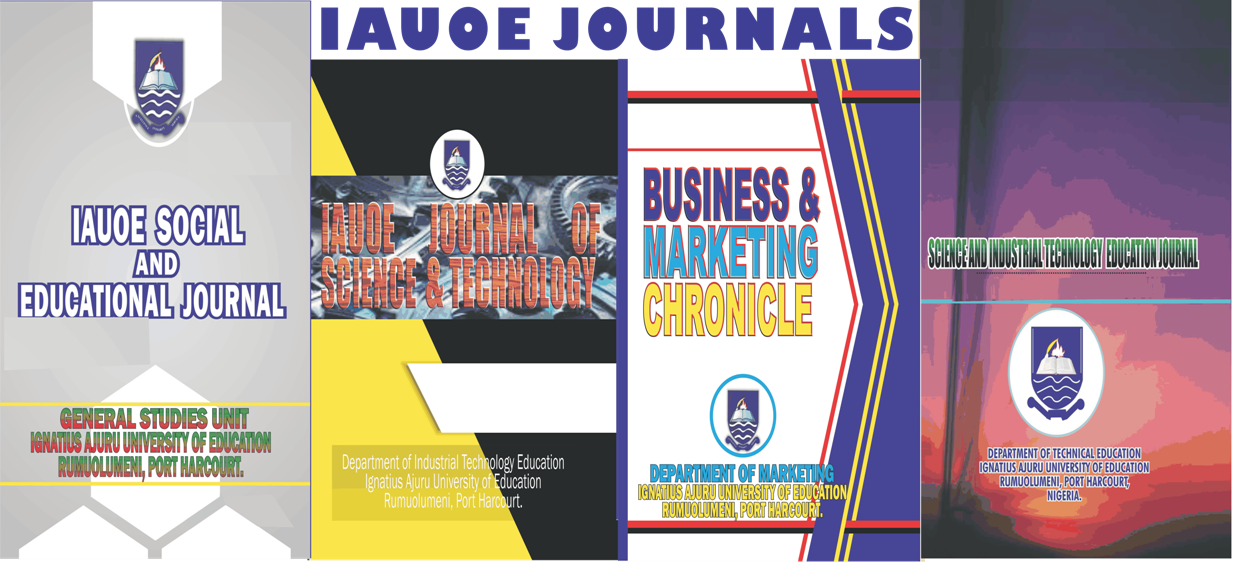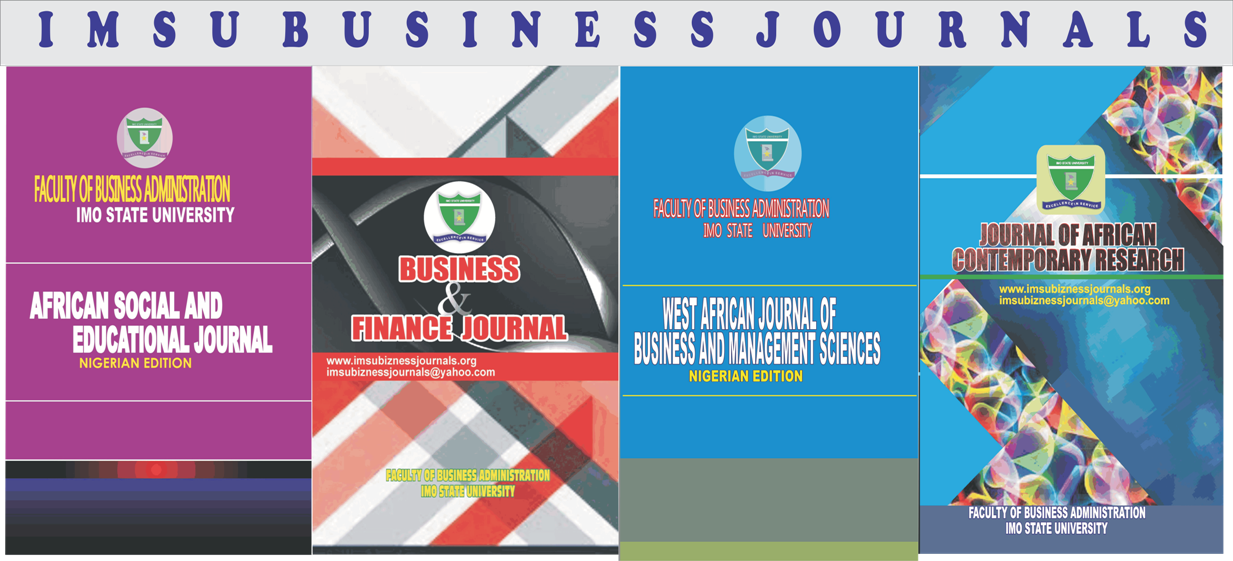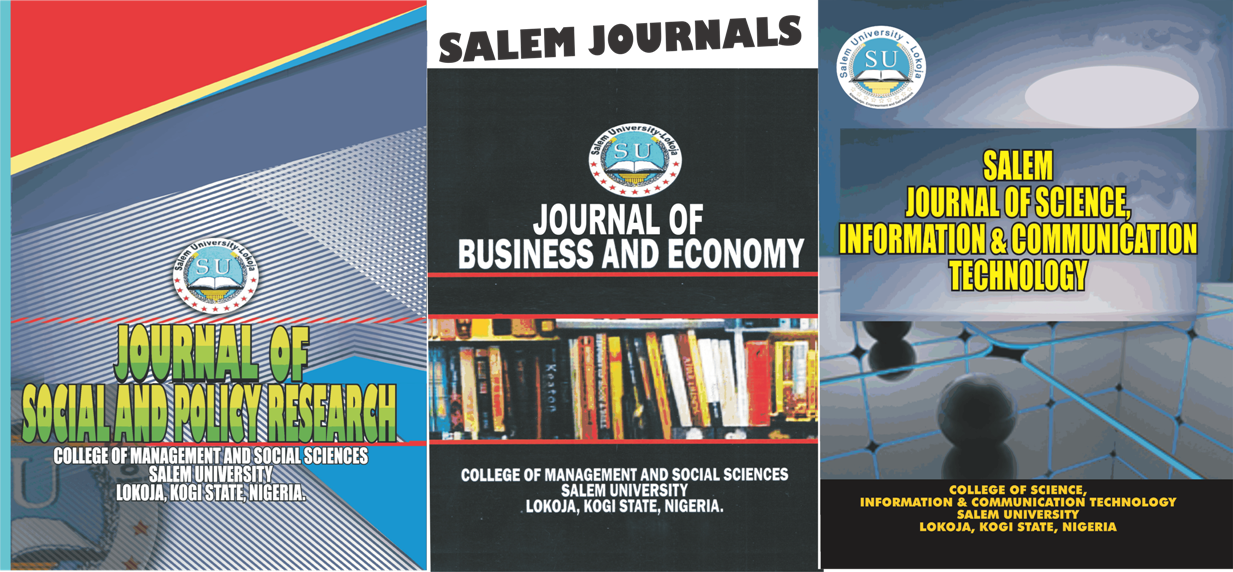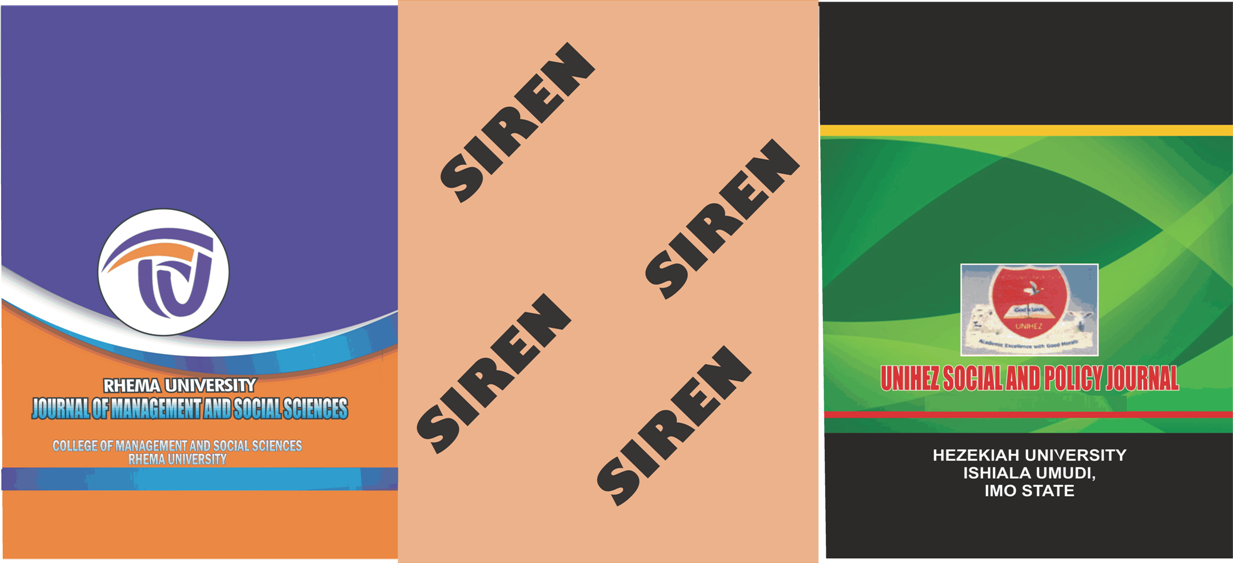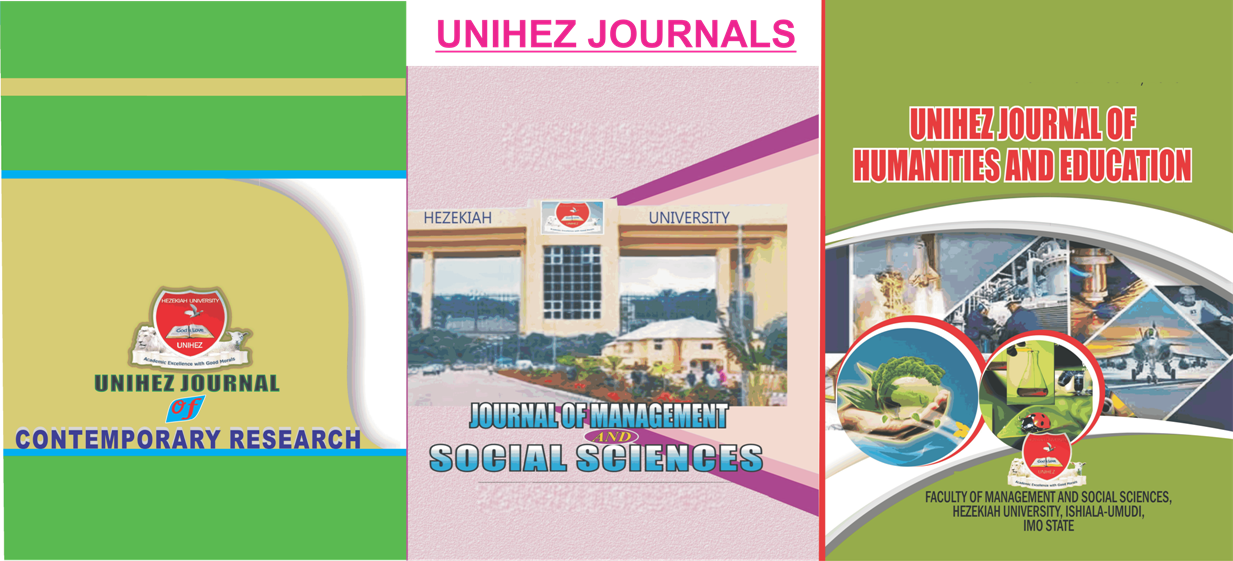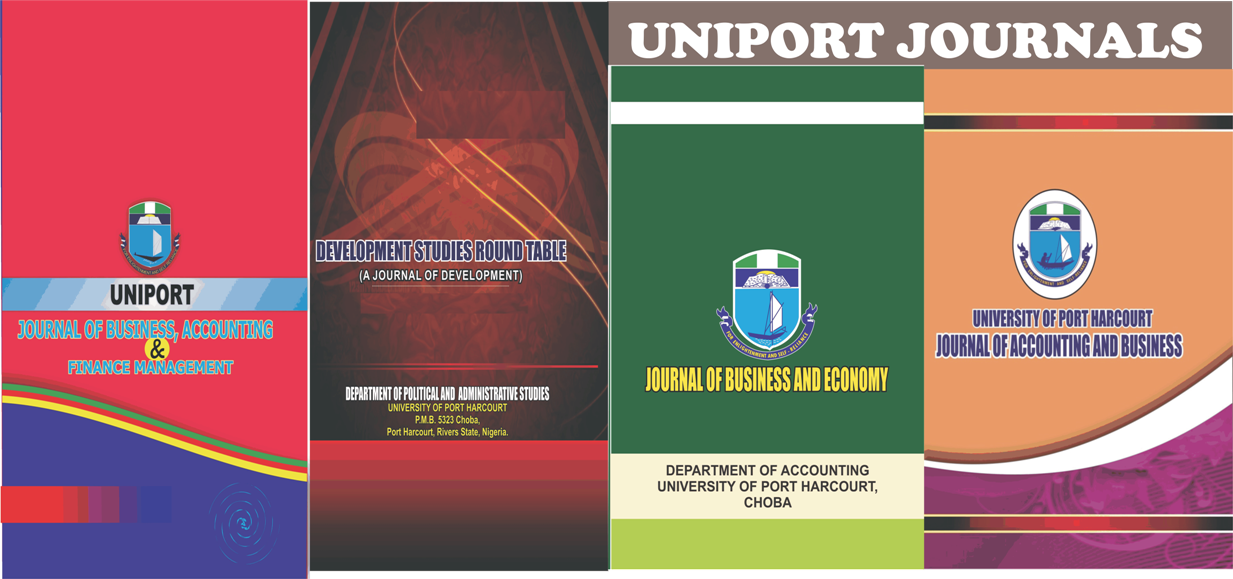2021 Archive
| 1 |
Title: SECTORAL MICROCREDIT ALLOCATION AND ECONOMIC GROWTH IN NIGERIA AN ERROR CORRECTION APPROACH.pdf Author: Zacchariah L. E., Nwinee Barisua Fortune & Nnamdi Ikechukwu Samuel Abstract: Abstract Micro enterprises constitute veritable vehicle for economic prosperity in both advanced and developing nations of the world. The realization of this entrepreneurial goal is a function to which microcredits function to lead, aid and re-enforce entrepreneurship. Hence, the need to empirically examine the feasible causal association between sectoral micro credits disbursements and Nigeria economic prosperity. The ordinary least square approach was adopted to ascertain the causal association between sectoral micro credit disbursements and Nigeria economic growth. Yearly information was assembled from Central Bank of Nigeria statistical bulletin for the period 1992-2019 by using Pairwise causality test. Gross domestic product was a function of microcredit to agriculture/ forestry, mining and quarrying, manufacturing / food processing, real estate and construction and transport and commerce sectors. The study revealed lack of causal association between the dependent and the independent variables. This is in line with the Schumpeterian thesis where monetary segment operates independent of the economy. Thus, the regulatory authorities should formulate implementable policies such as reduction in cost of borrowing to encourage investment borrowings, re-introduction of compulsory sectoral lending to the constructive sectors by all micro credit establishment as well as the disbursement of microcredits through cooperatives are possible remedial steps to be taken. Keywords: Sectoral Microcredit Allocation, Economic Growth in Nigeria, Granger Causality Approach. View |
| 2 |
Title: FINANCING DECISION AND SHAREHOLDERS’ WEALTH MAXIMISATION OF NIGERIA LISTE COMPANIES.pdf Author: Akintomide Akintunde., Nwaobia Appolos Nwabuisi & Ogundajo Grace Oyeyemi Abstract: Abstract The primary objective of financial managers is to utilize the available resources to increase the company value that would lead to the shareholders’ wealth maximization. The wealth maximization is the major challenge facing firms as a result of financial sub-optimality. The study examined the relationship between financing decision and shareholders’ wealth maximization. Ex-post facto research design was adopted. Data were extracted from a sample of thirty-five (35) non-financial firms listed on the Nigeria Stock Exchange for a period of ten (10) years (2008 to 2017), giving 350 firm-year observations. The effect of self-financing, equity-financing and debt-financing on market value added were empirically tested using multiple linear regression analysis. The findings indicated that financing decision had significant effect on market value added; self-financing had positive and significant effect on market value added, equity-financing negatively and significantly affected market value added while debt-financing (DFD) had insignificant negative effect on market value added. Results further revealed that firm size significantly controlled the effect of financing decision on market value added. The study opined that management should enhance their financial planning strategy and increase the asset base of the firm for the achievement of shareholders’ wealth maximization objective. Keywords: Debt finance, Equity finance, Financing decision, Self-finance, Shareholders’ wealth, Size. View |
| 3 |
Title: ECONOMIC GROWTH AND EXCHANGE RATE DYNAMICS IN NIGERIA.pdf Author: Anifowose, Abolaji Daniel (PhD) Abstract: Abstract This paper presents empirical test results on the effect of exchange rate on economic growth in Nigeria with emphasis on asymmetric relationship among the variables (Gross Domestic Product, Exchange Rate and Inflation Rate) using data from 1981 to 2020. Applying the Non Linear Autoregressive Distributed Lag Model (NARDL) approach to examine asymmetric relationships among variables. The study found that, in the long-run, economic growth is positively affected by positive shocks to exchange rate. Meanwhile, both negative and positive shock to inflation rate was found to have adverse non-contemporaneous effect on growth in the long-run. Since both positive and negative changes affect economic growth adversely, it is recommended that the Nigeria Inflation component is reviewed to identify the key drivers and the policy to optimize the relationship between economic growth and inflation rate. In addition, fiscal, monetary and general trade policies must align with the exchange rate policies for desired output growth. Therefore, the monetary authority should implement policies that will boost Nigeria production base to maximize the benefits from foreign exchange inflows. Keywords: Economic Growth, Exchange Rate, Inflation Rate, Gross Domestic product View |
| 4 |
Title: SECTORAL MICROCREDIT ALLOCATION AND ECONOMIC GROWTH IN NIGERIA AN ERROR CORRECTION APPROACH.pdf Author: Zacchariah L. E., Nwinee Barisua Fortune & Nnamdi Ikechukwu Samuel Abstract: Abstract This study applied “Vector Error Correction Model” to examine possible effect of sectoral micro-credit allocations or distribution on Nigeria economic or monetary growth. This study was aimed at ascertaining the extent to which micro-fund allocated or distributed to some real sectors impacted or affected Nigeria economic growth. Time series data were sourced from CBN report from 1992-2019, Nigeria economic welfare (GDP) was used as dependent parameter while micro-funds allotted to agriculture/forestry, mining/quarrying, manufacturing/food processing, real estate/construction and transport /commerce were used as independent parameter to capture sectoral micro-funding allocation. Multiple regressions were used to estimate the association between sectoral micro-fund distribution and economic welfare while descriptive statistics were employed to examine vacillations or fluctuation in the variables. Ordinary Least Square (OLS), Augmented Dickey Fuller (ADF) Test and Johansen Co-integration test were used to conduct the investigations and analysis. The study revealed that 57.7% changes in Nigeria GDP could be explained by changes in micro-fund allotted to these sectors. Micro-fund allotted to transport/commerce positively and inappreciable impacted on GDP, micro-fund allotted to real estate/construction sector negatively and inappreciable impact on GDP, micro-fund allotted to manufacturing sector positively and appreciable affected GDP, micro-fund allotted to mining/quarrying negatively and inappreciably impacted on GDP while micro-fund allotted to agriculture/forestry sector negatively and appreciable impacted on GDP in Nigeria. From these findings, it was concluded that micro-fund allotted to these sectors appreciable impacted on economic growth in Nigeria and therefore recommends for re-introduction of abolished compulsory sectoral lending operation and sectoral reforms to attract microcredits. Keywords: Sectoral Microcredit Allocation, Economic Growth, Error Correction Approach. View |
| 5 |
Title: IMPACT OF CAPITAL STRUCTURE OF A FIRM ON ITS MARKET TO BOOK VALUE EMPIRICAL EVIDENC EFROM NIGERIA AND GHANA.pdf Author: Ogboghro Vincent I. & Edore Julius Ovefeyen Abstract: Abstract This study adopts the Arellano-Bond first difference dynamic panel GMM framework to consider the effect of capital structure decision on a firm’s market to book value ratio focusing on quoted firms in Nigeria and Ghana. Our sample is panel, comprising 17 quoted firms (Nigeria from 11 and Ghana from 6) from 2008 to 2017. Three measures of capital structure: namely, debt-to-equity ratio, non-current liability to total assets and interest coverage ratio are examined. Our results suggest that capital structure is irrelevant in determining a firm’s market value relative to its book value. Therefore, we argue that investors in Nigeria and Ghana cannot improve their risk pricing model by incorporating capital structure variables in the valuation process. Key words: Capital structure, market-book value ratio, panel GMM. View |
| 6 |
Title: INSTITUTIONAL CREDITS AND ECONOMIC DEVELOPMENT IN NIGERIA AN ARDL PERSPECTIVE.pdf Author: Omotayo F. Akinpelumi., Prince C. Nwakanma & Ikechukwu S. Nnamdi Abstract: Abstract Motivated by the need to uncover the specific influences of credits mobilized by various financial institutions in Nigeria on economic development in Nigeria, the study examined the influence of institutional finance on economic development in Nigeria over the period of 1992 to 2019. The study employed the misery index as a measure of development and considered domestic and foreign financing institutions. Secondary data was employed and culled from the annual report and repository of the Central Bank of Nigeria, the World Bank, the African Development Bank, the Bank of Agriculture, and the Bank of Industry. The employed data analysis techniques in the study are the Stationarity, Autoregressive Distributive Lag, the stepwise ARDL, and the Granger Causality tests. The study observed mixed stationarity at level and first difference. In the long run, it was observed that only the immediate past value of deposit money bank credits, Bank of agriculture credit, Bank of industry credit, and Microfinance bank credits had a valuable influence on the economic development. Only microfinance bank credit and African development bank credit are seen to aggravate the level of misery index in Nigeria, while the employed foreign institutions credits show no valuable influence on the misery index. In light of these findings, the study recommended that the financial institutions should ensure consistency in the growth and mobilization of funds to avoid the ‘’big push trap’ as erratic mobilization of credit is counterproductive. Domestic and foreign financial institutions must review their financial services models and adapt them to those of the informal sector to ensure that they capture significantly the peculiar and workable models which encompass flexibility and loose access to financial services, which would improve the level of financial inclusion in the economy. Keywords: Institutional credits, finance, economic development, Autoregressive distributive lag. View |
| 7 |
Title: DETERMINANTS OF TAX MORALE IN SME’S IN NIGERIA.pdf Author: Otuedon, Ajueyitse Martins & College, E. Ogodogun Abstract: Abstract The Broad Objective Of The Study Is To Examine The Determinants Of Tax Morale. The Research Design For This Study Is The Exploratory Research Design. A Sample Size of 400 SME’S was used as the Sample for the Study. The Study Employs The Ordinal Regression Analysis As The Data Analysis Method. Focusing On The Determinants Of Tax Morale And Using The Ordinary Least Square Regression Techniques, This Study Found That; (I) Taxpayers Demographics Has A Positive And Significant Effect On Tax Morale Which Is Also Statistically Significant At 5% (Ii) Tax Knowledge Also Appears To Have A Positive Effect On Tax Morale And Also Statistically Significant At 5% Level And (Iii) Perception Of Tax Fairness And Equity Service Quality Has A Significant Influence On Tax Morale And Also Statistically Significant At 5% Level. Consequently The Study Recommends That Unnecessary Complexities In The Tax System Should Also Be Eliminated. Keywords: Tax Morale, Perception of Tax Fairness and Equity and Tax Knowledge. View |
| 8 |
Title: TAX REVENUE AND ECONOMIC GROWTH IN NIGERIA.pdf Author: Wobo, Henry Orowhuo & Amadi, Uzoamaka Iheyinwa Abstract: Abstract Motivated by the dwindling government financial resources and rising economic needs, this study examined the relationship between tax revenue and economic growth in Nigeria over the period of 1994 to 2018 was used. The study employed secondary data gotten from annual reports of the World Bank database and the Central Bank of Nigeria statistical bulletin. The study employed the stationarity test and Autoregressive Distributed Lag (ARDL) regression analysis. It was uncovered that; petroleum profit tax, company income tax, customs and excise duties, and value-added all showed an insignificant effect on economic growth as measured by the annual growth rate of gross domestic product, also has insignificant influence on GDP, customs and excise duties have no significant influence on GDP. Conclusively, the study found that tax revenue had an insignificant effect on economic growth in Nigeria. Given these observations, the study recommended that the government should engage in a complete re-organization of tax administration mechanisms or systems to minimize the rate of tax evasion and avoidance to the barest minimum. Also, there should be a stringent penalty imposed on any individual or corporate body who indulge in any form of tax malpractices; 3. government through Federal Inland Revenue Service (FIRS) should create a reliable database for every taxable person to reduce (if not eliminate) the occurrence of tax evasion and there should be constant training and re-training of tax administrators. Finally, there should be a constant review of existing tax laws and tax policy just as is obtainable in other climes. Keywords: Tax revenue, Economic Growth, Petroleum Profit Tax, Company Income Tax. View |
| 9 |
Title: HOW FAR DO INSTITUTIONAL CREDITS PROMOTE NIGERIA’S ECONOMIC DEVELOPMENT.pdf Author: Omotayo F. Akinpelumi., Prince C. Nwakanma & Ikechukwu S. Nnamdi Abstract: Abstract Propelled by the need to evaluate how changes in institutional credits support changes in the development of the Nigerian economy, this study investigates the causal relationship between institutional credits and economic development in Nigeria over the period of 1993 to 2019. The study employs the misery index as a measure of development. Secondary data was employed and gotten from the annual report of the Central Bank of Nigeria, the World Bank, the African Development Bank, the Bank of Agriculture, and the Bank of Industry. The employed data analysis techniques in the study are the Stationarity and Granger Causality tests. The study observed mixed stationarity at level and first difference. The study uncovers that only domestic institutional credits from deposit money banks, bank of industry, and microfinance banks are cable of promoting and supporting economic growth through significant employment generation, stimulation of output growth, and mobilization of credit at favorable rates, while the Primary Mortgage Institutions and Bank of Industry alongside foreign financial institutional credits from the African Development Bank and World Bank failed miserably in promoting or supporting economic development in Nigeria. In light of the observed findings, it is recommended that domestic and foreign financial institutions could improve their hold on the economy by creating better streamline financial services that would improve the level of financial inclusion in the economy, such as non-internet loan applications like the Unstructured Supplementary Service Data. From an internal perspective, various financial institutions should strive to uphold key brand differentiators such as; low fees, community service, friendly customer service, institutional mission, and personal client relationships. Keywords: Institutional Credits, Misery Index, Causality, Economic Development. View |
| 10 |
Title: ELECTRONIC ADVERTISING AND SALES VOLUME OF BEER FIRMS IN PORT HARCOURT.pdf Author: ANUONYEH, ANSELEM Abstract: Abstract This study is focuses on electronic adverting and sales volume of Beer firms in Port Harcourt, Rivers State. The study is positioned to investigate the relevance of electronic (online) advertising on volume of sales of brewery firm’s products in the consumer market. The study adopted questioners design. The data collected were analyzed using simple percentage and the analysis of variance (ANOVA) statistical tool under the SPSS environment. The major findings of the study include that advertising banners, splash screen, interstitials and electronic mail have significant influence on the volume of sales of beer producing firms in Port Harcourt. It was recommended that firms in the breweries industry should develop the habit of building and maintaining good communication channel to reach out target audience at their convenience. Similarly, the concept of electronic advertising should be adopted by beer manufacturing firms in Port Harcourt in their annual budget. View |
| 11 |
Title: BOARD DYNAMICS AND FINANCIAL PERFORMANCE OF QUOTED COMMERCIAL BANKS IN NIGERIA.pdf Author: Wobo, Henry Orowhuo & Ogolo, Jessie Ibitelema Abstract: Abstract Propelled by the attendant agency issues, which has led to the collapse of various organizational, the study investigated the impact of board dynamics on the financial performance of deposit money banks in Nigeria over the period of 2008 to 2017. Secondary data was gathered from the annual financial reports of quoted deposit money banks in Nigeria. It was discovered that board composition contributes significantly to financial performance measured as return on assets and market to book ratio. The data gathered on non-executive directors serving on the boards of banks revealed that nonexecutive directors on the average are more than the executive directors (and this is in compliance with the requirements of corporate governance issued by the Security and Exchange Commission code which requires that the number of non-executive directors should be higher than the executive directors) confirming why performance is positively impacted by board composition. However, based on the estimated results other dimensions of board dynamics did not show a significant effect on financial performance, nonetheless, they show both positive and negative effects. In view of these findings, the study recommended that; the size of the board (membership) should be increased but not exceed the maximum number specified by the code of corporate governance for banks because the results of the analysis in this study did not show any significant effect of board size on performance, and that the number of non-executive directors should be increased on the board because they are significantly responsible for promoting banks’ performance. Keywords: Board Dynamics, Financial Performance, Board Attributes, Commercial Banks. View |
